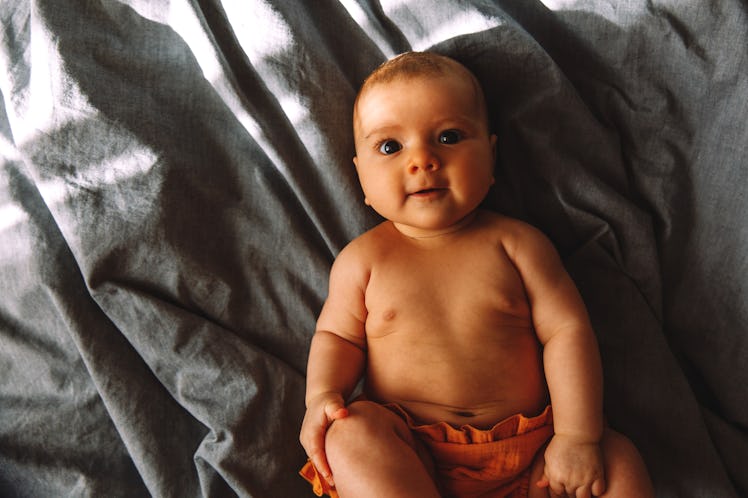5 Weird Facts About Babies That Freak Out New Parents
They might cry without tears and have extra bones, but you love your baby anyway.

Babies are dry-crying, mustache-eating wildcards who will fill homes with irrational amounts of laughter. Studies suggest that this is all deeply peculiar, but also very normal. Babies are weird, and that’s how it’s supposed to be. Despite how little they bring to the table in terms of conversation, infants make great conversation pieces for this very reason. One can admire their weirdness. Here are the five strangest facts about tiny humans.
Your Baby Probably Had a Mustache
During the second trimester in the womb, male and female fetuses develop light mustaches that spread throughout their bodies. Along with a waxy substance known as vernix, this hair, known as lanugo, is meant to protect the fetus’s skin from amniotic fluid. Typically the hair either falls out, is reabsorbed, or eaten by the baby in the womb. But occasionally some hair sticks around, especially on premature babies. Despite the look, it does not mean you have to change the name of your baby to Burt.
Newborns Cannot Cry
Newborn babies might seem like they cry from the moment they emerge, but that’s actually just screaming. Infants cannot actually make their own tears until they’re at least two weeks old. And many babies can take up to two months to start the waterworks.
The time in between a few weeks and a few months can be challenging to get through because the absence of tears could mean clogged tear ducts. But this usually comes with other symptoms such as yellow discharge, and it can be treated with drops or ointments, they but typically go away on their own within the first year.
In instances where the baby has a fever, tear-free crying may be a sign of severe dehydration, so it’s important to consult with your pediatrician and make sure they get plenty of fluids. But in most cases, they’re crying without tears because their faces don’t work right.
Boy Infants Get Boners and Girls Get Mini Periods
Any parent of a boy who’s changed a few diapers knows that babies totally get erections, and everyone else is probably scared to google it. Scientists aren’t entirely sure why it happens, but pediatricians are pretty sure it’s normal.
Likewise, it’s common for baby girls to bleed like they’re having mini periods during their first week of life, and surprisingly not because life is a nightmare. Rather, this occurs because a surge of maternal hormones during pregnancy can occasionally stimulate the infant’s uterus for a short period of time.
And They Have Almost 100 Extra Bones
Babies have about 300 bones whereas adults only have 206, but it’s not as weird as it sounds. Infants have such a surplus of tiny bones to make them more flexible to pass through the birth canal. These eventually fuse together to consolidate into a fully formed skeleton. The same way that a baby’s soft spots close on their skull within their first 2 years of age, the bones in their body are doing the same thing. Right now they might be tiny Jenga games held together with cartilage, but that too shall pass.
They’re Not Mocking You, They Genuinely Laugh That Much
Infants laugh about 300 times a day compared to adults who only laugh about 20 times a day, psychologist and neurologist Robert Provine told Mental Floss. Other research shows that most babies laugh and smile within their first few months, and boys tend to laugh slightly more than girls.
Scientists suspect that baby laughs aren’t just cute. They may be a useful tool to test how infants respond to stimuli and better screen for developmental disorders such as autism — and ideally lead to earlier and more effective interventions one day.
But for more parents, these extra laughs make the delirious, sleep-deprived stupor that comes with parenthood a bit more amusing. So embrace the hot crowd while you have it. Those giggles will turn into groans one day.
This article was originally published on